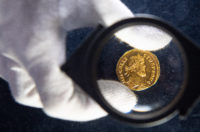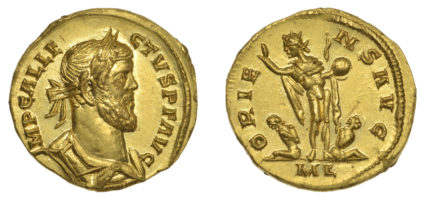 The gold coin of Allectus found by a metal detectorist in a freshly-plowed field near Dover, Kent, has sold for £552,000 ($703,000), far above its pre-sale estimate of £70,000-100,000. The auction at Dix Noonan Webb (DNW) in London on June 6th saw fierce bidding on the extremely rare coin, minted by the usurper Allectus between 293 and 296 A.D., driving the price way up until it finally went to a private collector bidding over the phone.
The gold coin of Allectus found by a metal detectorist in a freshly-plowed field near Dover, Kent, has sold for £552,000 ($703,000), far above its pre-sale estimate of £70,000-100,000. The auction at Dix Noonan Webb (DNW) in London on June 6th saw fierce bidding on the extremely rare coin, minted by the usurper Allectus between 293 and 296 A.D., driving the price way up until it finally went to a private collector bidding over the phone.
As Christopher Webb, Director and Head of DNW’s Coin Department noted: “I am delighted with the phenomenal price achieved in today’s sale. This is the most expensive coin that we have ever sold at Dix Noonan Webb – as well as being one of the world’s most expensive Roman coins, it is the most money ever paid for a coin of Allectus and it is now the most valuable Roman coin minted in Britain to have been sold at auction. It was a unique opportunity to acquire a stunning coin and the only other one known struck from the same pair of dies is in the British Museum.”
He continued: “There are only 24 aurei of Allectus known worldwide. Gold coins were initially produced to pay an accession donation in AD 293 but continued to be issued throughout his reign and were probably demonetized after his death in AD 296, as no coins of Carausius or Allectus are found in later hoards.”
The next time someone finds an ancient Roman aureus, they won’t be allowed to sell it to the highest bidder. Revisions to the Treasure Act of 1996 will plug the loophole that allows single coins, even ones of unquestionable museum quality due to their age, precious metal content, rarity and historical importance, to be kept or sold by finders at their whim so they can disappear into anonymous private collections like this one now has.
